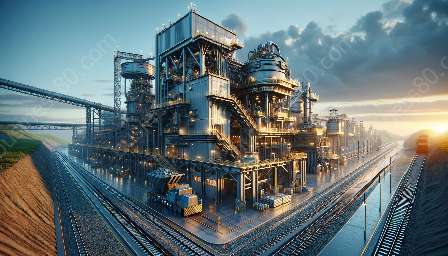Aluminum production is a crucial process in the metals & mining industry, involving various stages from mining to refining. This comprehensive guide explores the entire process of aluminum production and its significance in the global economy.
1. The Aluminum Mining Process
Before delving into the production process, it's important to understand the initial steps in aluminum production, which begin with mining. Aluminum mining involves extracting bauxite, the primary ore of aluminum, through surface or underground mining methods.
Bauxite, a mixture of minerals such as gibbsite, boehmite, and diaspore, is typically found in tropical or subtropical regions. The extraction process often requires clearing land, which can have environmental implications. Once the bauxite is mined, it undergoes a refining process to extract alumina, the precursor to aluminum metal.
2. Refining Bauxite into Alumina
The next stage in aluminum production is the refining of bauxite into alumina through the Bayer process. This involves crushing and grinding the bauxite ore to a fine powder and then mixing it with a hot, concentrated solution of sodium hydroxide. The mixture undergoes a series of chemical reactions, leading to the formation of aluminum hydroxide, which is then heated to produce alumina.
The refining process also generates a byproduct known as red mud, which presents environmental challenges due to its alkaline and toxic elements. Efforts are underway to find sustainable solutions for managing and reusing red mud to minimize its environmental impact.
3. Producing Aluminum Metal
Alumina, the refined form of bauxite, serves as the feedstock for producing aluminum metal through an electrolytic process called smelting. In this process, alumina is dissolved in molten cryolite (a mineral used as a flux) within an electrolytic cell. When an electric current is passed through the cell, aluminum is deposited at the cathode, while oxygen is released at the anode.
The production of aluminum metal requires significant energy, and therefore, the availability of low-cost electricity is a critical factor in determining the location of aluminum smelting facilities. Furthermore, efforts are ongoing to develop more energy-efficient smelting technologies to reduce environmental impact and operating costs.
4. Environmental Impact and Sustainability
Aluminum production can have environmental implications, particularly in terms of energy consumption, greenhouse gas emissions, and waste generation. However, the industry has been making strides in improving its environmental performance through initiatives focused on energy efficiency, recycling, and sustainable practices.
Recycling plays a crucial role in the sustainability of aluminum production, as recycling aluminum requires only a fraction of the energy needed to produce it from raw materials. Additionally, the use of renewable energy sources for smelting operations is gaining traction to reduce the carbon footprint of aluminum production.
5. Uses and Applications of Aluminum
Aluminum is a versatile metal with a wide range of applications across various industries. Its lightweight, durable, and corrosion-resistant properties make it suitable for manufacturing products such as automobiles, aircraft, beverage cans, construction materials, and electronic devices. The demand for aluminum continues to grow as industries seek sustainable and innovative materials for their products.
6. Future Prospects of Aluminum Production
As the global economy and industrial sectors evolve, the demand for aluminum is expected to increase, driven by ongoing technological advancements and the transition to cleaner energy solutions. The aluminum industry is also focusing on enhancing its circular economy practices by promoting recycling and reducing waste throughout the production lifecycle.
Overall, aluminum production plays a pivotal role in the metals & mining industry, providing essential materials for various applications while navigating the challenges of environmental sustainability and operational efficiency. Understanding the process of aluminum production is crucial for stakeholders in the metals & mining sector to make informed decisions and contribute to the industry's advancement.

